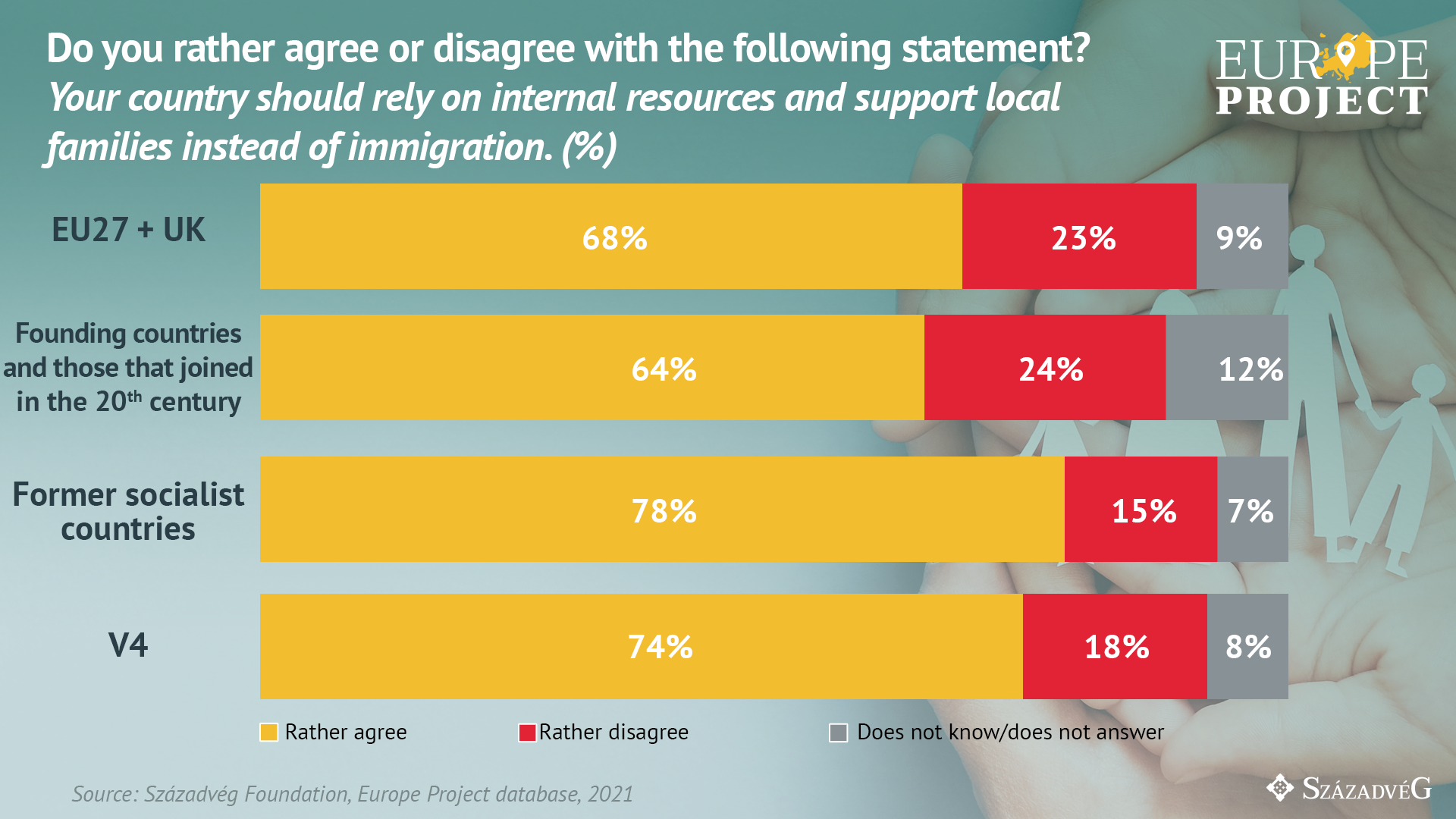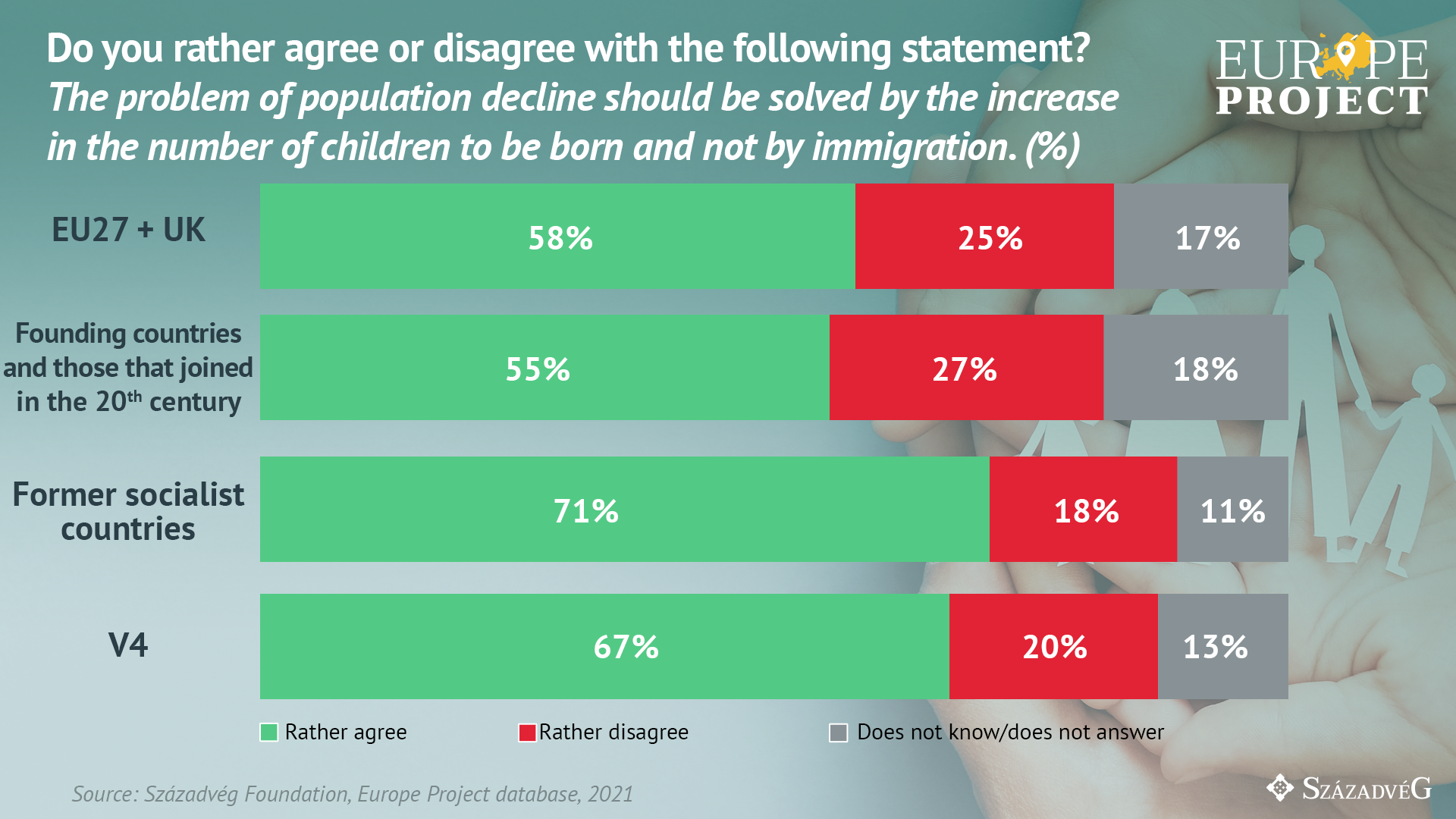In addition to / instead of immigration, family support is preferred by Europeans
It has intensified after the immigration crisis in 2015 and long been debated that the above-mentioned demographic problems should be rather addressed by family policy instruments, either by policy interventions to encourage childbearing, and / or by allowing or even encouraging small or large-scale immigration. However, despite the fact that the Hungarian government emphasises the first approach much more, it is important to know that our borders are not hermetically closed, and opportunities for regular migration still exist.
It should be clear that in 2019, people who were not born in Hungary represented 5.8 percent of the total Hungarian population.1 That year, three thousand, and in 2020 a little over two thousand people were also granted Hungarian citizenship.2 And while 55.3 thousand foreign citizens immigrated to Hungary in 2019, another 43.8 thousand did so in 2020, and the vast majority of them did not come from the territory of the European Union.3
It is no coincidence that we draw a parallel when it comes to immigration and family policy. Demographic challenges are not always easy to respond to by encouraging childbearing, given that the relevant costs will be recovered economically in generations (because of, inter alia, a significant increase in labour exposure due to more and more young children and elderly people, i.e., the number of dependents per worker). Therefore, it is worth striving for a kind of optimum between the increase in fertility and the regulation of legal, regular migration.4
However, the possibility in Lutz and Scherbov’s5 first seemingly rough calculations should be considered in more detail, namely that only 0.1 percent increase in the total fertility rate in Europe would be almost equivalent to 375,000 immigrants arriving in the EU by 2050.
For all this, we will also see that both Hungarians and the European population, if asked for their opinions, would place rather more emphasis on the increase in fertility.
Within the framework of the series of research of the Europe Project and its antecedent, Project 28, Századvég has been conducting a survey across Europe since 2016, surveying thousand people by each country on a range of public issues. In 2021, we asked the European adult population two questions addressing the former dilemma.
On the one hand, we asked European citizens whether they thought their country should rely more on its internal resources, supporting local families, or put immigration at the forefront. The results seemed to show a sharp difference between the former socialist European countries and the V4 group, and the founding countries and those that joined in the 20th century. In the case of the V4 countries, 74 percent of respondents and 78 percent of the population in the post-socialist countries agreed that their country of residence should rely on internal resources and support local families instead of immigration. In contrast, this proportion is relatively lower among the founding countries and those that joined in the 20th century, though it is still two-thirds, 64 and 68 percent, respectively. Among the individual countries, the proportion of those agreeing is the highest in Romania, Latvia, and Hungary (87-88 percent). The share of those who disagree is highest in Luxembourg (42 percent), Sweden, Norway, and Ireland (31 percent each).
We further sophisticated the question and asked whether the problem of population decline should be solved by immigration or by increasing the number of children to be born in a given country. The results again show a relatively significant difference in the climate of opinion between the groups of countries examined. That is, there is a much greater consensus among the former socialist and V4 countries on the issue compared to the founding countries and those that joined in the 20th century. Although just over half of the population in the former group agrees that “the problem of population decline should be solved by the increase in the number of children to be born and not by immigration”, a quarter of them argue, and a bit more than one-sixth of them were surprisingly unable to articulate an opinion on the issue. The share of those who agree is the highest in Hungary, with a value of 87 percent, and it is 84 percent each in Lithuania and Bulgaria. This time, the proportion of those who disagree is the highest in Ireland, the UK, and Sweden (36-39 percent).
So, we can see that
the majority of Europeans, the vast majority of the former socialist bloc, especially the Hungarian population, would prefer to see a solution to population problems in increased fertility rather than migration,
but it is also clear that the combination of the two is not necessarily mutually exclusive, as we can also see that our borders are not closed to foreigners, especially if immigration takes place according to regulations.
The importance of family ties is undisputable across Europe
Respondents across Europe confirmed the above when asked how important it would be that the state support families and family formation, regardless of migration. In 2020 and 2021, 81 percent indicated that they consider the issue to be more or less important.
Regarding the support of large families, we can see a greater disparity of opinions, but last year (52 percent) and this year (55 percent) an absolute majority had a positive opinion, and the proportion of opponents was one-third, considering the outstanding proportion of those who refused to answer. The difference between the founding countries and those that joined later is relatively minor, but it is a fact that
while 54 percent of the 20th century founding countries side with the financial support of large families, this proportion is 59 percent in the post-socialist countries, including 80 percent of the Hungarian population.
The group of those who consider it especially important to support young people in encouraging childbearing has also strengthened over the year: Last year, half of them and this year, 53 percent thought that young people in Europe should be helped in this area, while the proportion of those who oppose it is one-third. This time, the gap is even bigger between the two parties in the EU, with 69 percent of the population in the former socialist countries in favour of the issue. Among all the areas surveyed, the Hungarian population took the lead, with 88 percent agreeing with the financial support of young people in this area.
Finally, it should also be pointed out that only 5 percent of all respondents indicated in the related question that a childless family would be ideal for them, i.e., the vast majority consider having at least one child (7 percent), but the absolute majority, 58 percent, consider having two children satisfactory, while 17 percent consider having three children and 4 percent consider having even more children optimal. We, Hungarians also excel in this field, considering that 40 percent in Hungary are in favour of having three children. Only Estonians and Latvians are ahead of us in this area with 45 percent each.
Home-start subsidy is not only the need of Hungarians
There is also an almost two-thirds consensus across Europe that it would be important for families to live in their own property,
with only 30 percent disagreeing. Here, too, we find striking differences between the EU countries. However, this cannot only be attributed to attitudes but also to the cultural background of housing, i.e., the issue is less supported in countries where living in a rented property has a dominant culture, and the proportion of self-owned properties is lower (Austria, Denmark, Germany, Norway, etc.). The proportion of those who agree is the lowest in Denmark, only 26 percent, while it is the highest in Hungary, 90 percent.
In the first half of 2016, the Századvég Foundation conducted a public opinion poll survey covering all 28 European Union Member States, with the aim to analyse the opinions of EU citizens regarding the issues that most affect the future of the EU. In a unique way, Project 28 conducted the widest possible survey of 1,000, that is a total of 28,000 randomly selected adults in each country. Gaining an understanding of society’s sense of prosperity and mapping the population’s attitudes towards the performance of the European Union, the migration crisis and the increasing terrorism were among the most important goals of the analysis. The Századvég Foundation, on behalf of the Hungarian Government, conducted the research again in 2017, 2018 and 2019, which continued to reflect on the topics that most determined the European political and social discourse.
In 2021, the aim of the survey is again to map the population’s attitude towards the most important public issues affecting our continent. In addition to society’s sense of prosperity, the performance of the European Union and the attitudes towards the migration crisis, in line with the latest challenges affecting Europe, the dominant theme of this year’s poll is the coronavirus pandemic, climate change, energy supply and family policy. In addition to the European Union Member States, the 2021 research covered the United Kingdom, Norway, and Switzerland, interviewing a total of 30,000 randomly selected adults using the CATI method between 1 and 15 September.
[1] OECD database: Foreign-born population. https://data.oecd.org/migration/foreign-born-population.htm#indicator-chart
[2] KSH database: Persons who have acquired Hungarian citizenship according to the country of their previous citizenship (from 2000). https://www.ksh.hu/stadat_files/nep/hu/nep0033.html
[3] KSH database: Immigrant foreign nationals by country of citizenship. https://www.ksh.hu/stadat_files/nep/hu/nep0028.html
[4] The background research in this area is very extensive. C.f. Lutz et al. 2019.
[5] Lutz–Scherbov 2007.


